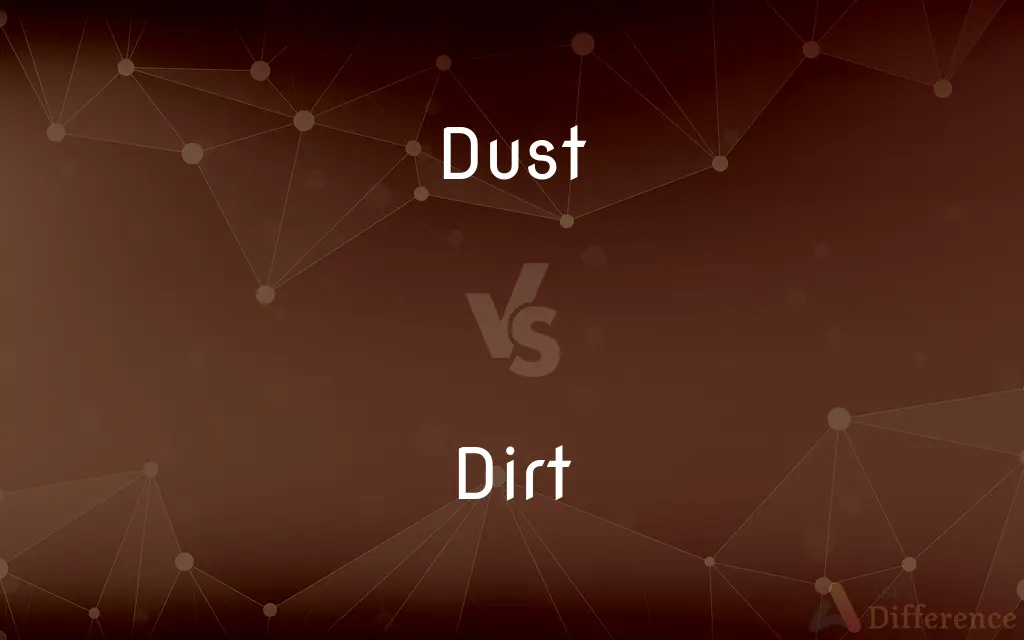Dust vs. Dirt — What's the Difference?
Edited by Tayyaba Rehman — By Maham Liaqat — Updated on March 7, 2024
Dust comprises fine particles from various sources like pollen, skin cells, and fibers, found mostly indoors, whereas dirt is a mixture of soil, sand, and organic matter, commonly found outdoors.

Difference Between Dust and Dirt
Table of Contents
ADVERTISEMENT
Key Differences
Dust is a fine powdery substance typically found indoors, composed of small particles including pollen, skin cells, fibers, and dust mites. These particles accumulate on surfaces over time and can contribute to indoor air pollution. Whereas dirt is a more general term referring to soil, sand, organic matter, and other particles found on the ground outdoors. It's often associated with gardening, construction, and outdoor activities.
Dust can affect indoor air quality and has potential health implications, such as triggering allergies or respiratory issues. It is often managed through regular cleaning practices like dusting and vacuuming. On the other hand, dirt is considered a natural part of the outdoor environment and can be beneficial, providing nutrients to plants and supporting various ecosystems.
Dust particles are typically smaller and lighter than dirt, allowing them to remain airborne for longer periods. This characteristic makes dust more likely to be inhaled, posing health risks particularly for those with respiratory conditions. Whereas dirt, being heavier, tends to settle more quickly and is less likely to become airborne unless disturbed.
In terms of composition, dust can include a wider variety of human-made materials, such as textile fibers, paper particles, and pet dander. This diversity reflects the indoor environments where dust accumulates. Dirt, however, primarily consists of natural earth materials and organic matter from plants and animals.
Despite their differences, both dust and dirt require management to maintain cleanliness and health. In homes, dusting and vacuuming are effective against dust, while controlling dirt involves managing outdoor activities and keeping exterior spaces clean.
ADVERTISEMENT
Comparison Chart
Composition
Fine particles including pollen, skin cells, fibers
Mixture of soil, sand, organic matter
Location
Typically found indoors
Commonly found outdoors
Health implications
Can trigger allergies, respiratory issues
Generally harmless, unless contaminated
Management
Dusting, vacuuming
Gardening, construction management
Particle size
Smaller, lighter, can remain airborne
Heavier, settles quickly
Compare with Definitions
Dust
Fine particulate matter.
Dust accumulates on furniture, consisting of tiny particles like skin cells and fibers.
Dirt
Soil and organic matter.
Gardening involves handling dirt, rich in nutrients for plants.
Dust
Cleaning practices.
Vacuuming with a HEPA filter effectively reduces dust levels indoors.
Dirt
Control measures.
Keeping a clean entryway can minimize the amount of dirt tracked indoors.
Dust
Indoor air quality.
Regular dusting helps improve indoor air quality by removing allergens.
Dirt
Natural environment.
Dirt supports plant growth and ecosystems.
Dust
Health risks.
Inhaling dust can exacerbate asthma and allergies.
Dirt
Outdoor substance.
After a day of hiking, shoes are typically covered in dirt.
Dust
Diverse composition.
Household dust can contain a mix of pollen, pet dander, and dust mites.
Dirt
Heavy particles.
Dirt from the garden settles quickly and rarely becomes airborne.
Dust
Dust is made of fine particles of solid matter. On Earth, it generally consists of particles in the atmosphere that come from various sources such as soil lifted by wind (an aeolian process), volcanic eruptions, and pollution.
Dirt
Dirt is unclean matter, especially when in contact with a person's clothes, skin or possessions. In such case they are said to become dirty.
Dust
Fine, dry particles of matter.
Dirt
Earth or soil.
Dust
A cloud of fine, dry particles.
Dirt
A filthy or soiling substance, such as mud or dust.
Dust
Particles of matter regarded as the result of disintegration
Fabric that had fallen to dust over the centuries.
Dirt
Excrement.
Dust
Earth, especially when regarded as the substance of the grave
"ashes to ashes, dust to dust" (Book of Common Prayer).
Dirt
A squalid or filthy condition.
Dust
The surface of the ground.
Dirt
One that is mean, contemptible, or vile.
Dust
A debased or despised condition.
Dirt
Obscene language or subject matter.
Dust
Something of no worth.
Dirt
Malicious or scandalous gossip.
Dust
Chiefly British Rubbish readied for disposal.
Dirt
Information that embarrasses or accuses.
Dust
Confusion; agitation; commotion
Won't go back in until the dust settles.
Dirt
Unethical behavior or practice; corruption.
Dust
To remove dust from by wiping, brushing, or beating
Dust the furniture.
Dirt
Material, such as gravel or slag, from which metal is extracted in mining.
Dust
To sprinkle with a powdery substance
Dusted the cookies with sugar.
Dust crops with fertilizer.
Dirt
Soil or earth.
Dust
To apply or strew in fine particles
Dusted talcum powder on my feet.
Dirt
A stain or spot (on clothes etc); any foreign substance that worsens appearance.
Dust
(Baseball) To deliver a pitch so close to (the batter) as to make the batter back away.
Dirt
Previously unknown facts, or the invented "facts", about a person.
The reporter uncovered the dirt on the businessman by going undercover.
Dust
To clean by removing dust.
Dirt
(figurative) Meanness; sordidness.
Dust
To cover itself with dry soil or other particulate matter. Used of a bird.
Dirt
(mining) In placer mining, earth, gravel, etc., before washing.
Dust
Fine particles
Dirt
Freckles
Dust
(uncountable) Fine, dry particles of matter found in the air and covering the surface of objects, typically consisting of soil lifted up by the wind, pollen, hair, etc.
Dirt
To make foul or filthy; soil; befoul; dirty
Dust
Submicron particles in outer space, largely silicates and carbon compounds, that contribute greatly to extinction at visible wavelengths.
Dirt
Any foul of filthy substance, as excrement, mud, dust, etc.; whatever, adhering to anything, renders it foul or unclean; earth; as, a wagonload of dirt.
Whose waters cast up mire and dirt.
Dust
(obsolete) A single particle of earth or other material.
Dirt
Meanness; sordidness.
Honors . . . thrown away upon dirt and infamy.
Dust
(countable) The act of cleaning by dusting.
Dirt
In placer mining, earth, gravel, etc., before washing.
Dust
The earthy remains of bodies once alive; the remains of the human body.
Dirt
To make foul of filthy; to dirty.
Dust
(figurative) Something worthless.
Dirt
The part of the earth's surface consisting of humus and disintegrated rock
Dust
(figurative) A low or mean condition.
Dirt
The state of being covered with unclean things
Dust
Cash; money (in reference to gold dust).
Dirt
Obscene terms for feces
Dust
(colloquial) A disturbance or uproar.
To raise, or kick up, a dust
Dirt
Disgraceful gossip about the private lives of other people
Dust
(mathematics) A totally disconnected set of points with a fractal structure.
Dirt
(of roads) not leveled or drained; unsuitable for all year travel
Dust
(transitive) To remove dust from.
The cleaning lady needs a stool to dust the cupboard.
Dust
(intransitive) To remove dust; to clean by removing dust.
Dusting always makes me cough.
Dust
(intransitive) Of a bird, to cover itself in sand or dry, dusty earth.
Dust
(transitive) To spray or cover something with fine powder or liquid.
The mother dusted her baby's bum with talcum powder.
Dust
To leave; to rush off.
Dust
To reduce to a fine powder; to levigate.
Dust
(slang) To kill.
Dust
Fine, dry particles of earth or other matter, so comminuted that they may be raised and wafted by the wind; that which is crumbled to minute portions; fine powder; as, clouds of dust; bone dust.
Dust thou art, and unto dust shalt thou return.
Stop! - for thy tread is on an empire's dust.
Dust
The earth, as the resting place of the dead.
For now shall sleep in the dust.
Dust
The earthy remains of bodies once alive; the remains of the human body.
And you may carve a shrine about my dust.
Dust
Figuratively, a worthless thing.
And by the merit of vile gold, dross, dust.
Dust
Figuratively, a low or mean condition.
[God] raiseth up the poor out of the dust.
Dust
Gold dust
Dust
To free from dust; to brush, wipe, or sweep away dust from; as, to dust a table or a floor.
Dust
To sprinkle with dust.
Dust
To reduce to a fine powder; to levigate.
Dust
Fine powdery material such as dry earth or pollen that can be blown about in the air;
The furniture was covered with dust
Dust
The remains of something that has been destroyed or broken up
Dust
Free microscopic particles of solid material;
Astronomers say that the empty space between planets actually contains measurable amounts of dust
Dust
Remove the dust from;
Dust the cabinets
Dust
Rub the dust over a surface so as to blur the outlines of a shape;
The artist dusted the charcoal drawing down to a faint image
Dust
Cover with a light dusting of a substance;
Dust the bread with flour
Dust
Distribute loosely;
He scattered gun powder under the wagon
Common Curiosities
Can dust be harmful to health?
Yes, dust can trigger allergies and respiratory issues due to its composition, which may include allergens and irritants.
What is dust made of?
Dust consists of fine particles including pollen, skin cells, fibers, and sometimes dust mites, typically found indoors.
How does dirt differ from dust?
Dirt is a mixture of soil, sand, and organic matter, primarily found outdoors, while dust is composed of finer particles and found indoors.
Is dirt always dirty?
While dirt can be messy, it is a natural substance that is beneficial for the environment, providing nutrients to plants.
How can I reduce dust in my home?
Regular dusting, vacuuming with a HEPA filter, and maintaining clean air filters can significantly reduce dust levels.
What tools are best for dust removal?
Microfiber cloths and vacuum cleaners with HEPA filters are effective in removing and trapping dust.
What common items contribute to household dust?
Common contributors include shed skin cells, pet dander, textile fibers, and dust from outdoor sources.
Why does dust accumulate so quickly?
Dust accumulates due to the constant shedding of skin cells, fabric fibers, and the introduction of outdoor particles.
Is there a difference in how dust and dirt affect allergies?
Dust is more likely to trigger allergies due to its composition, including allergens like dust mites and pet dander.
Can dirt be used for anything positive?
Beyond gardening, dirt can be used in construction (as a building material) and in creating natural habitats.
Are there beneficial aspects of dirt?
Yes, dirt provides essential nutrients to plants, supports ecosystems, and is a key component of the natural environment.
How often should I clean to keep dust at bay?
Regular cleaning, at least weekly, is recommended to manage dust accumulation effectively.
Can improving indoor air quality reduce dust?
Yes, using air purifiers and maintaining HVAC systems can help reduce airborne dust and improve indoor air quality.
Can plants grow in dust?
Plants generally cannot grow in dust due to its lack of nutrients and poor water retention compared to dirt.
Why is dirt important to the environment?
Dirt supports plant growth, holds moisture, and houses countless organisms, contributing to biodiversity.
Share Your Discovery

Previous Comparison
Utility vs. Tool
Next Comparison
Servant vs. MaidAuthor Spotlight
Written by
Maham LiaqatEdited by
Tayyaba RehmanTayyaba Rehman is a distinguished writer, currently serving as a primary contributor to askdifference.com. As a researcher in semantics and etymology, Tayyaba's passion for the complexity of languages and their distinctions has found a perfect home on the platform. Tayyaba delves into the intricacies of language, distinguishing between commonly confused words and phrases, thereby providing clarity for readers worldwide.
















































